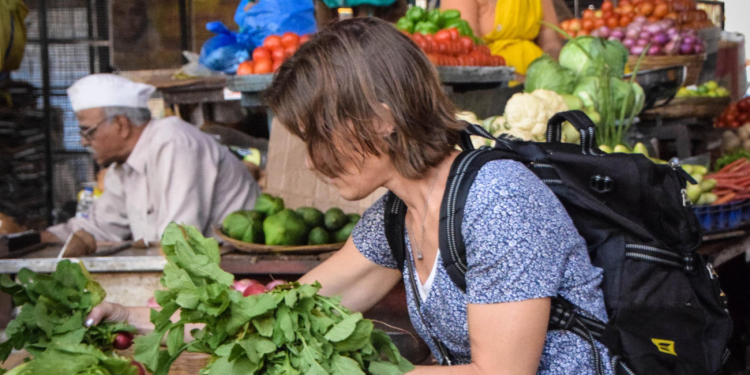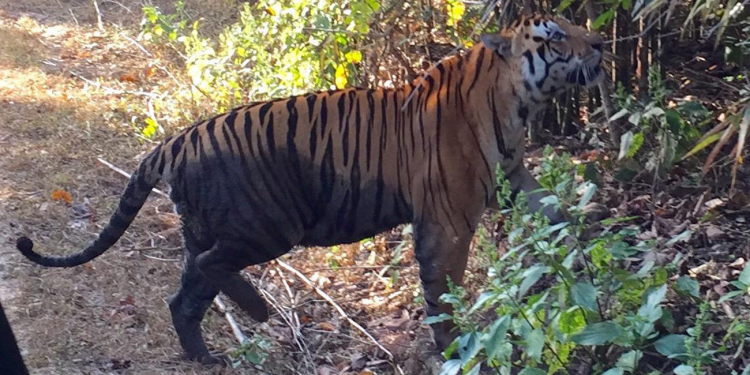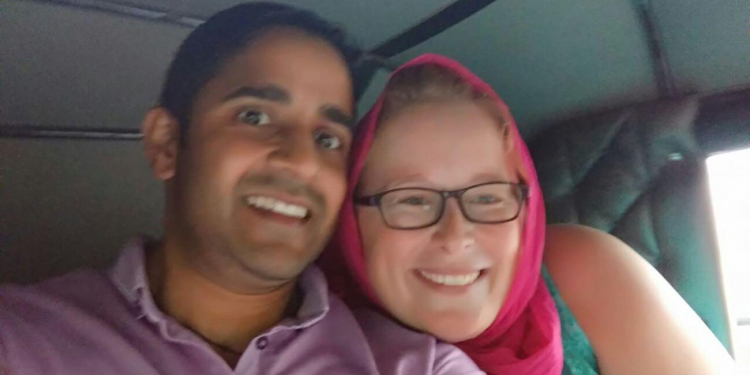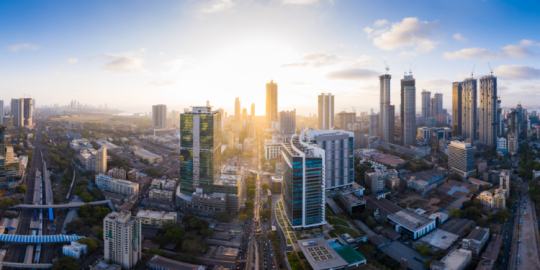Hi Karen, can you please introduce yourself?
The easiest answer to the question - who are you? – is simply Karen Ironside. Although that in itself isn't always accurate in India! I have lived for so long now outside of Ireland that I am Irish in name but probably not Irish in culture anymore (well not completely anyhow!).
Equally, I'm Karen Ironside legally in some parts of my life, but Karen Donaldson in other areas. My passport still being in my maiden name (Donaldson), therefore my Indian visa also is. Consequently, this means that I spend all my life trying to remember when I am an Ironside and when I am a Donaldson. Anything legal here, I am a Donaldson, but then for everything else Ironside. Though, sometimes I forget and use the wrong name. I always feel it must come across as a little crazy when someone asks me my name and I say – I'm not sure!
I moved to Pune with my husband about 18 months ago from Stratford upon Avon (Shakespeare's birthplace). Chris works for Jaguar LandRover that are owned by Tata Motors. He has been seconded to Tata for three years.
Prior to moving here, I was the Head of English in a middle school near Stratford. I had however been extremely ill and, after a year off, had only just gone back full-time a few weeks before the opportunity to move to India came up.
I still teach voluntarily in Pune. Once a week, I head out to a village school about 90 minutes outside of Pune and teach girls from this rural village. It is extremely hard work, harder work than even some of the tough, rough classes from my past teaching experience (seriously, I worked in a school that had to have a full-time police officer on site because of the gangs!). The girls have such a different and to be honest limited way of learning that even the simplest of tasks can become very complicated because they have no experience of thinking for themselves / being independent. I love it though.
I also teach a young man in a poor area in the very heart of the oldest part of Pune. This is an incredible opportunity to see how others in this vast city live. Something impossible without regular access to it. Soon, I hope to teach four women from the same community. Half Hindu and half Muslim: this community is very mixed while also being very separate.
Why did you choose to expatriate to India?

Ultimately, I was the driving force behind wanting to move abroad! My husband learned to accept it and then learned to like it! Why? I haven't lived permanently in Ireland since I finished university, so I already lived abroad (yes, Ireland is not the UK), so I would be just moving to another abroad. I had also lived in Poland for 4 1/2 years and loved the opportunity to embrace a new culture, meet new people and learn a new language.
For me, once I feel comfortable somewhere, I want to move on. Why? Simple - the world is huge and there is so much to see, but modernity means it is also small – you can travel anywhere and still communicate with anyone around the world. Why spend time being comfortable when you can go out there and see more of the world and learn more about it? A sense of complete security and being comfortable in my environment isn't really my bag. In fact, it is kind of boring. Not something always understood by family, although my closest friends are absolutely no different to me!
We had talked about trying to find an expat assignment abroad for a quite a few years. While my husband was in the army, we wondered about whether we could be posted abroad. A job came up in Luxembourg, but the army is the army, so in the end my husband ended up moving to another camp 2 miles down the road!
A job had also come up in China near Shanghai and we were definitely up for it, but then squabbles to do with who would pay salaries meant that we gave up even thinking about it! We discussed a job in Saudi Arabia which on paper was perfect for Chris, but then who wants to work for the Saudi military / government helping them to develop weapons to use ultimately against their own people? Financially, it would have been a windfall for us, but morally we decided we couldn't do it.
So by the time India came up, no discussion was really to be had. My husband sent me a text message that said, “A job has come up in this place. What do you think?” followed by a wikitravel link to the city. I had a quick glance (literally between class swap overs) and sent the message, “Go for it!”. We didn't really consider whether it was a good idea or not. We are young, no major responsibilities (no kids), so what could the worst be? Worst case scenario, we come home with our tail between our legs and get over it followed by having a funny story to tell. Best case scenario – our lives are changed forever!
As an Irish expat, what where the procedures you had to follow to move there?
Being Irish didn't particularly affect the process of my moving to India – the system is the same from wherever you come in Europe. In fact, the process of moving to India was actually significantly easier than the process of moving my cats to India! All I had to do was fill in a visa form (the system kept crashing, so I knew it off my heart by the end), upload a photo and my husband had to write a letter saying he would support me.
My husband, on the other hand, had to provide all sorts of documentation – educational qualification proofs, job offer, new contract and randomly his old contract including his old salary! What does it matter about what he used to earn? I understand them worrying about the salary he would have to live on here, but his UK salary? Ah, process mam! It is part of the process, so one should never question the process! Heaven forbid!
Once here, we were lucky enough to have an immigration agency that organized most things for us. We had to register at the Foreigners Registration Office (connected to the police) which can be really time consuming, but we just had to turn up, show our passports, agree that our eyes were blue or in Chris' case given he has blue / green eyes; and they were confused they just wrote down brown – who was he to question it? Every year, we have to repeat this process to get our new visas. Without an agent, it would really have been way more challenging.
Our cats on the other hand – 30 individual pieces of documentation – including Chris' old contract and salary, 24 individual monthly bills (who has them anymore? - but I could provide 20 months and I didn't tell anyone and nobody noticed!), notarized letters, etc. Only two or three of the pieces of paperwork actually related to the cats and their health. Chris also had to write a letter promising to support them – changed my name in his letter about me to their names – job done! It was a nightmare, but the reality is that our pet relocation agent had to do even more work! In the end, we missed a deadline to bring the cats in via Mumbai by a day, so they were taken through Delhi where our agent assured us they had good working relationships (I will allow you to decide what that means – we chose not to ask!).
How long have you been in the country?
We have been in Pune since May 2015 and will be here until May 2018. Time has flown by, but it also feels like I have never lived anywhere else.

What has attracted you to Pune?
Pune isn't exactly an attractive location – you don't look online and think, ‘wow, look at that road, hotel, building, park'. It is not aesthetically beautiful, so I think the only reason we were “attracted” to Pune was simply the job opportunity and the opportunity to live in another culture / country.
Now, I realize just how much there is to be attracted to here. People are so warm, welcoming and caring – when they aren't trying to cheat you because you are a foreigner! It is a weird dichotomy – people would do anything for you personally, but professionally they are happy to tell you they will do things and then won't do them at all.
I love the beauty of the street scenes – yes, you have to get over the broken down buildings and rubbish strewn streets, but ignore that and for a second look at the colors of the women's saris / kurtas, look at the color of the vegetables in the market, the beauty of the wizened old man sat watching the world go by, notice the beautiful Peshwar (pre-colonial rulers) mansions that may be falling apart, yet you can still see the beautiful wood engraved doors.
There are places in India that are jaw droppingly beautiful (Kerala, a Goa beach), but in Pune the beauty is easily missed if emotionally you aren't open to seeing it.
What has surprised you the most at your arrival?
Fundamentally, I knew very little about India before I moved here. I had pre-conceived notions to do with poverty mainly. My huge surprise waking up the first morning (having arrived in the dark) in our hotel was opening the curtains and seeing palm trees! I felt so silly but I never associated palm trees with India! So silly.
What surprised me, initially, was the deep ingrained sense of not taking responsibility for anything beyond your immediate need. So take a community example – India houses, no matter how poor, are completely spotless. The area outside of their homes will be spotless. Immediately outside of this area will be filthy, with broken down pavements, rubbish everywhere – looking like no one cares. This is also true. Where in the West our sense of community extends to the village / town / city we live in, here it seems to in general only extent to the street you live on if even that far.
Translate this sense of not taking responsibility to business and you have people who are only trying to help themselves, to make sure they don't get into trouble – if that means avoiding taking responsibility so you can say it didn't go wrong because of you, that is fine. What it means, however, is that many businesses are run completely inefficiently and the sense of customer service doesn't always exist.
This affects your life in every way from things not being in the shops when you need them, to waiting for 6 hours for someone to do something in your home and then they never turn up, to products coming to market years late and millions of pounds over budget.
Add this to the idea of process – you must follow process at all times and it is not your responsibility to question the process. So, for example, a security guard is told to check your receipt when you leave a shop but nobody told them to check your goods or your receipt. So you have the stupid situation of having your receipt stamped / punched and you walk off wondering what did that achieve. It certainly doesn't stop shop lifting – my friend and I accidentally shop lifted when some things from a supermarket slipped behind her baby's seat. We didn't notice until too late to return them, and yet the security guard checked our receipts upon leaving the store!
This, I never considered. It has led to some extremely frustrating times. I always say about India when people ask do I like it: I love it, but I don't know why I'm not in prison for punching somebody's face in!
Was it difficult to find accommodation there?

There is lots of accommodation in Pune, but if you want a western quality apartment / house, that is more challenging. Indians, in general, live in a very different way to us. A/C isn't traditional, so houses tend to be quite dark to keep them cooler, kitchens are very rarely open plan – you have a maid who does all the cooking, so why would you want it open to the rest of the house? The standard of workmanship can be really bad. The only way then to get something that we would consider western standard is to spend a lot of money on high-end apartments – not the sort of money you would spend in China, but a lot considering the cost of living in India and average salaries.
Looking for accommodation in India can be psychologically challenging! The culture here is that when a person commits to a property, only then is the work done on the apartment. So you will go in and most will be absolutely filthy, I mean horrendously filthy. Floors may be not laid or not laid properly, kitchen cupboards might be falling apart. New properties may have no storage built in or maybe even no electricity connected yet. Landlords don't want to spend the money until they have a guaranteed income. Some understand that expats aren't going to be willing to accept that, so will do the work before signing contracts. Others will refuse. This can mean you will see apartment after apartment that are really unacceptable for people to see who are moving half way around the world. The better relocation agents understand this and do their best to counteract it. This is my biggest piece of advice: try and find an agent who has lived outside of India – so they understand that how things work here is not how things work elsewhere.
What are the local labor market's features? Is it easy for an expat to find a job there?
Pune is a university city which has drawn the automotive and call center industries to it. Tata Motors was one of the first car companies in the city. People here, as a whole, then tend to be more educated and better off than in similar size cities in India. Many are university educated although again the quality of the education can be questioned. Many of the top global universities will no longer accept on face value Indian qualifications without further testing.
An expat is unlikely to come and be able to pick up a job here, largely for visa reasons. Most people come in with companies they already work for. The CEO type jobs people may be head hunted to come here. The problem in India is not necessarily an expat finding a job but the companies who want to operate here finding someone willing to move here. Many of the automotive companies want engineers – so many (sorry engineers) find change difficult, and therefore expecting them to move half way around the world is a big ask. The engineers I know here are very different to the average engineers I know in the UK! Clearly, these ones are the less engineery engineers!
How do you find the Indian lifestyle?
Our lifestyle here is very privileged! For the first time in our lives, we have the money and, to a certain extent, the time to really experience life. We travel an awful lot. I have done more in the last 16 months than I had probably ever done in my life and I didn't think I had done little before I moved here.
We have traveled to Kerala, Goa, Rajasthan, Singapore, Australia, Spain and the Maldives, and we are going to Dubai during Diwali in November and Sumatra for Christmas and New Year with plans to go to Bali in February and New Zealand July 2017.
In terms of our life here, I also think we are very privileged. We can afford to eat in nice restaurants, be members of nice clubs (again our company pays), etc. Last Sunday, I had brunch in the Westin Hotel and then went across town for drinks in the executive club in the JW Marriott. No way could I have afforded to do that without being an expat.
We are also really lucky that here we have a maid and a driver. It's nice to be able to go out on an evening and know you don't have to worry about how to get home.
All of this comes at a price though – life here isn't all fancy hotels. It is worry about dengue from mosquitoes, traffic jams, long working hours, not being able to find basic things that would make our lives so much easier. It is about going to 10 shops to do the weekly grocery shop and it taking all day whereas in the UK you would go to the shop 10 minutes from your house and be home an hour later. It is about sitting in an office knowing that most of the people around you don't really care about what they are doing and feel little or no responsibility.
It is easy to get caught up in an extravagant lifestyle, but some also forget that that is the compensation for the really challenging aspects of life here. On the other hand, some take for granted the extravagancy and get caught up in the challenging aspects of living here and seem to refuse to see anything positive in where they live. For me, it is about trying to strike a balance.
The challenging part of your lifestyle here is white privilege. You can get away with anything because you are white. People will not question you. There are times when somebody is being ridiculous (must follow the process mam) that I will use white privilege. Nobody is quite sure what to do when you don't follow the process! I try not to though, it isn't right. That for me is challenging however – I don't want to be different to anyone else. I don't want people to assume I have rights just because of the color of my skin.

Have you been able to adapt yourself to the country and to its society?
I adapt extremely quickly to wherever I go. I'm not really afraid of anything (when it comes to exploring, etc. – the weird insect the other day on the other hand...). I think this lack of fear means that I have very quickly come to know the city and this has helped me to adapt quickly.
Over the last 16 months, I have learned so much about the Indian society that increasingly it is easier / harder to understand how it works – which helps with settling in. I say easier / harder to understand: just because I understand how something works doesn't mean I understand why something works. Take, for example, the role of women in India – I understand their role, I just don't understand why people think it is acceptable.
One thing that has really shocked me here is my utter failure to develop any form of non-https://www.expat.community. Normally, wherever I move, I quickly develop a foreign and local friendship network – not here, and I don't really understand why. I have some friends who are from India, but very few.
What does your every day life in Pune look like?
As the non-working party, my life here is very varied, but it is extremely full. I want to take advantage of every minute. I have a couple of fixed items in my itinerary – I go to the gym twice a week, I teach in a village school every Thursday, every Tuesday afternoon a group of women get together to play cards (it is better than it sounds!). I also do art classes, play golf, teach a couple of children English and teach in an old part of town. I learn Hindi twice a week. The rest of the week is spent being practical – getting jobs done, but also meeting people to go exploring or have a coffee. Sometimes, even doing the most basic job can become an adventure and that I love!
When I first moved here, people were so nice to me that I take it as my ‘job' to pay it forward. I will always try and help new people as best as I can, so I often meet new people for a coffee. Some I never see again and some have become friends. Without the people who did the same for me, I would have been so lonely and so confused!
My husband works from 8 am to 4.30 pm every day and every second Saturday. He also studies Hindi twice a week. We try and go swimming on a Tuesday evening and usually end up meeting friends / going for dinner a couple of times a week. Brunch is a big thing, so we often do that! Chris also plays golf.
Some of the expat partners talk about being bored and how there is nothing to do here. Maybe they are right, right that is if they are not willing to step out of their comfort zones and just try things. Life is not going to be like it was at home and any expectation that it is will only lead to disappointment. You cannot replicate your life at home here – you can be partially successful, but it will never be the same. That's exciting isn't it!
Any particular experience in the country you would like to share with us?
One particular experience – you can't be serious – there are a million!
I could share with you sitting in a brass band warehouse in Jaipur with my friend and loads of guys in 45 degrees heat all jamming. A Swedish woman on a trombone and all these Indian guys on brass instruments and drums.
I could share with you my six hour experience of a camel safari into the desert near Pushkar with an 18 year old behind me, physically very excited about my presence (if you understand my meaning) all the way out and back!
I could share with you sitting on a house boat in Kerala, lazily floating around a lake.
I could share seeing a tiger 5 minutes before the end of the safari and then having to spend 20 minutes in a speeding Gypsy bouncing back to the park gate as we were late and the driver was going to be fined if he got back late.
I could share hearing a loud explosion and finding a glass door in our apartment had exploded. On getting there, I could share how I found my cats in absolute terror running across the broken glass to escape.
I could share my last week, where I was so sick I was sure I had dengue – luckily I didn't.
I could share with you my rickshaw ride across the city with my friend Nilesh last Sunday – helping another rickshaw find where it was going to and laughing with him so much.
I could share being shown into all the houses on the street in the old part of Pune where my student lives and meeting all his friends, neighbors and relatives and feeling so so grateful for such an amazing opportunity.
India is about a constant barrage of experiences some of which are just incredible (in fact most are, so let me explain). Some are just incredibly amazing – life enhancing and some are just so incredibly bad that all you want to do is cry. On the other hand, every experience is something that is life enriching in its own particular way.
What is your opinion on the cost of living in Pune? Is it easy for an expat to live there?

In terms of fruit, veg and meat, Pune is significantly cheaper than in the UK. Anything imported is expensive. Stock cubes are about 10 times the price that they are in the UK (I bring them in myself). Wine makes you cry, it is so expensive. A bottle of cheap but okay plonk in the UK will be 3 – 4 times more expensive here. If you come from abroad and if you don't bring wine, you aren't coming into my house – there is no discussion to be had on it!
We are paying £200 a month more for rent here (well our company are), but we have gone from a two-bedroom house to a very large three-bedroom apartment in a fabulous area. So in that respect, it is cheaper.
Electricity is very expensive! Staggeringly so. It is particularly bad in the heat of the summer when you use A/C a lot. Plus, although you can get things like energy saving bulbs, they don't come standard, so you have to remember to go out and buy them!
Gas is pennies – quite literally! Petrol is about 40% cheaper than in the UK, so our Discovery Sport is not costing stupid amounts to fill. We usually fill up once a week for about £30.
Eating out can be very, very cheap to quite expensive – again it depends on what you are drinking. Local beer and dinner in a moderately expensive place will still be significantly cheaper than a cheap place in the UK. Add a bottle of Indian wine and it is probably the same price as in a cheap place. Add a bottle of imported wine or a gin and tonic and it becomes 50% more. A few weeks ago, I had a meal with Chris and a friend in the Italian in the Hyatt Regency Hotel. We had 2 courses, two bottles of imported wine, 3 gin and tonics and a beer and it came to £135. A huge amount of money for here, but for the UK that would be an average meal out with wine for three people.
How do you spend your leisure time?
You could argue that as I don't have paid employment that all my time is leisure time, but I do volunteer and as much as that is rewarding – at times it feels like very hard work!
On moving here, I decided to use this three-year period where I didn't have to have paid employment to try new things – develop new hobbies. So now, I play golf, do art classes, have taken up photography, write my blog, go to the gym and swim.
Even when I am working – in the sense of getting the shopping done and that sort of thing – it is always an adventure. There are always things to see and experience. In that respect, although everyday jobs here can be hard work, you could never describe them as mundane.
Our social lives have improved dramatically! Nobody here has family or friends they have had for 20 years to fall back on. We all need each other for support, and for laughter and wine. I see friends almost everyday and we socialize in each other's houses or out at least once a week, often more.
As I said earlier, a huge addition to our leisure time is the ability to travel far more widely than we could previously. It does make you feel rather spoilt but hey – I'm not complaining!
Your favorite local dishes?
On moving here, I discovered I'd never had Indian food! I had had only British Indian food which is completely different from the food here. Really in the UK / Ireland, our Indian food is really Bangladeshi, but it is easier to call it Indian – people know where that is!
One of my favorite things to eat is a dosa – imagine a very thin crepe but crispy. Its made of ground lentils and rice flour. It can be stuffed with anything, but I love a Masala Dosa – basically filled with spicy potato – can never have too many carbs!
The revelation here is the vegetarian food. With a significant percentage of the population vegetarian for religious reasons, it is taken very seriously. Entire restaurants are vegetarian and in my opinion they do the best food. These places are very simple and very cheap, but ever so yummy!
What do you miss the most about your home country?

I miss, but not sure I really want on a full-time basis again, supermarkets! Somewhere where you can just go and pick up everything you need – meat, vegetables, cat litter, milk etc , etc. This is next to impossible here. While there are supermarkets, quality is not always amazing and you can't always guarantee something will be there the next time you need it! You should see the stockpiling going on in my cupboards! I have 30 kg of cat litter at the moment! Last time, it took 2 months to find some and my cats were not happy with their very stinky litter trays!
I also miss space and nice footpaths to experience the space on! I love the madcap chaotic nature of India, but a recent trip back to Stratford upon Avon and a fabulous walk along the river showed just how nice it is sometimes to just have peace and no people and an easy way to do it! Again, not sure I could live my entire life in such an easy way but sometimes it is nice to experience it again!
What has motivated you to write your blog “What will happen to me?”? How does it help?
My blog was not set up as a consequence of moving to India. It was up and running about 18 months by the time we moved. The driving force behind setting it up initially was to have an outlet for all the emotions I was experiencing as a result of being chronically ill. It was also a way of letting people know what was going on and explaining a little bit about why I was sick. My health was in far too poor a condition to explain to people individually my issues. I just didn't have the energy. My blog enabled me to do this.
What I never expected was to find that so many people who had my illness found my blog a breath of fresh air – someone who was open and honest about what was going on. Many shared it with their families in an attempt to explain what was happening to them when they just didn't have the words for it themselves.
I continued it upon moving to India, for almost the same reasons. It was a way of keeping people up to date with what was happening to us. Equally, it is a way of helping me to process my experiences and, finally, it is a historical record of some of our experiences in India. Something I can hopefully show my niece and nephews when they are older.
I have now also set up a Facebook page connected to the blog which is a great way to quickly share experiences and to start a more interactive dialogue with my readers.
I'm also really pleased that I now have a few friends who found my blog before moving here, contacted me, and then we met when they arrived. It's nice to be able to support people in their move, the way others supported me before I arrived.
Would you like to give any advice to soon-to-be expatriates in India?
Come with no expectations! Pack an open-mind and a determination to love India and you will! Fermina Daza, one of the main characters from “Love in A time of Cholera” by Gabriel García Márquez says, “I decide before I experience something that I will be happy and so I am. If I don't decide this, then I may be unhappy.” I read this as I was moving to India and I keep it in mind always. It is your mindset that will decide how content you are. Don't be one of those people always looking for the negatives and, therefore in the process, not having time to see the positives.
My last bit of advice is – you will have awful moments that make you sad, angry, frustrated or any other negative emotion you can imagine – they will pass and don't allow yourself to lose sight of why you came here and all the good opportunities you are having. Just have a bad moment, day, week and move on.
What are your plans for the future?
Plans! That became a conversation almost immediately upon arrival as it seems to do for most expats. We have no plans – no that is a lie! We have hundreds of plans, but which will work out – who knows!
The easiest plan is to go back to the UK and return to our old lives! I don't want that plan! It may have to be an intermediate step before we move on elsewhere, but I don't want to do it long-term.
So where else – it depends on where the work is, but we are considering Australia, New Zealand, Southern California, Sweden, Germany, Italy, Belgium, Singapore or maybe even Shanghai! I think we have the attitude that where the job comes up is where we will go!
Work wise change is definitely afoot for me. I won't stay in teaching, so what will I do? I'd love to somehow combine my love of writing, interacting with people and my management skills. Perhaps, project management of some kind. Ideally. I'd like to work within a non-profit environment and some form of educational development charity would be really interesting. It's scary not knowing what might happen next, but every closed door leads to another one opening somewhere else – sometimes, you just don't know what will be on the other side of this new door!



















Contact us to be featured in the Interviews section.
Participate